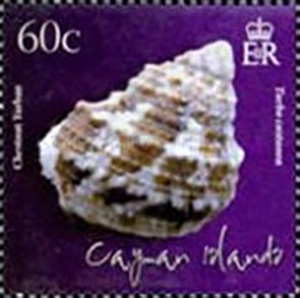Turbo castanea Gmelin, 1791

(Da: enwikipedia.org)
Phylum: Mollusca Cuvier, 1797
Classe: Gastropoda Cuvier, 1795
Ordine: Vetigastropoda Salvini-Plawen, 1980
Famiglia: Turbinidae Rafinesque C.S., 1815
Genere: Turbo Linnaeus, 1758
Descrizione
La lunghezza massima del guscio registrata è di 55 mm. Questa è una specie abbondante che è variabile sia nel colore che nella prominenza della scultura. Il guscio solido e imperforato ha una forma ovata-conica. È di colore arancione, marrone o grigio, a volte fasciato, infiammato o maculato con bianco o marrone. La guglia conica è acuta. L'opercolo è all'interno castaneo, con quattro spirali in rapido aumento. Il suo nucleo è un terzo della distanza attraverso la faccia. La superficie esterna è convessa e quasi liscia. È bianco o macchiato di marrone e verde intorno al centro.
Diffusione
La distribuzione include: Aruba, Belize, Bonaire, Mar dei Caraibi, Isole Cayman, Colombia, Costa Rica, Cuba, Curaçao, Golfo del Messico, Hispaniola, Giamaica, Messico, Panama, Porto Rico, Venezuela; nell'Oceano Atlantico dalla Carolina del Nord al Brasile. La profondità minima registrata è 0 m; la profondità massima registrata è di 141 m.
Bibliografia
–WoRMS (2010). Turbo castanea Gmelin, 1791. In: Bouchet, P.; Gofas, S.; Rosenberg, G. (2010) World Marine Mollusca database. Accessed through: World Register of Marine Species.
–"Chestnut Turban Snail-Brown". Accessed 25 December 2010.
–Turbo castanea Gmelin, 1791. Retrieved through: World Register of Marine Species on 27 September 2012.
–Welch J. J. (2010). "The "Island Rule" and Deep-Sea Gastropods: Re-Examining the Evidence". PLoS ONE 5(1): e8776. doi:10.1371 /journal. Pone. 0008776.
–G.W. Tryon (1888), Manual of Conchology X; Academy of Natural Sciences, Philadelphia.
–Gmelin, J. F. 1791. Systema naturae per regna tria naturae. Editio decima tertia. Systema Naturae, 13th ed., vol. 1(6): 3021-3910. Lipsiae.
–Röding, P. F. 1798. Museum Boltenianum. Viii + 199 pp. Hamburg.
–Anton, H. E. 1838. Verzeichniss der Conchylien. Xvi + 110 pp.
–Donovan, E. 1804. The Natural History of British Shells, including figures and descriptions of all the species hitherto discovered in Great Britain, systemically arranged in the Linnean manner, with scientific and general observations on each. Natural History of British Shells.
–Lamarck, [J. B.] 1822. Histoire naturelle des animaux sans vertèbres. Histoire Naturelle des Animaux sans Vertèbres 7: [iii] + 711 pp. Author: Paris.
–Philippi, R. A. 1849. Centuria altera testaceorum novorum. Zeitschrift für Malakozoologie 5: 99-112,
–Pilsbry, H. A. and T. L. McGinty. 1945. Cyclostrematidae and Vitrinellidae of Florida-I. Nautilus 59: 1-13, pls. 1-2.
–Usticke, G. W. Nowell. 1959. A Check List of Marine Shells of St. Croix. Vi + 90, 4 pls. Author: Christiansted, St. Croix.
–Weisbord, N. E. 1962. Late Cenozoic gastropods from northern Venezuela. Bulletins of American Paleontology 42(193): 672 pp., 48 pls.
–Turgeon, D.D., et al. 1998. Common and scientific names of aquatic invertebrates of the United States and Canada. American Fisheries Society Special Publication 26 page(s): 60.
–Alf A. & Kreipl K. (2003). A Conchological Iconography: The Family Turbinidae, Subfamily Turbininae, Genus Turbo. Conchbooks, Hackenheim Germany.
–Williams, S.T. (2007). Origins and diversification of Indo-West Pacific marine fauna: evolutionary history and biogeography of turban shells (Gastropoda, Turbinidae). Biological Journal of the Linnean Society, 2007, 92, 573–592.
–Rosenberg, G., F. Moretzsohn, and E. F. García. 2009. Gastropoda (Mollusca) of the Gulf of Mexico, Pp. 579-699 in Felder, D.L. and D.K. Camp (eds.), Gulf of Mexico–Origins, Waters, and Biota. Biodiversity. Texas A&M Press, College Station, Texas.
–Rubio F., Fernández-Garcés R. & Rolán E. (2011) The family Tornidae (Gastropoda, Rissooidea) in the Caribbean and neighboring areas. Iberus 29(2): 1-230. [December 2011].

|
Data: 30/06/2010
Emissione: Conchiglie marine Stato: Cayman Islands |
|---|